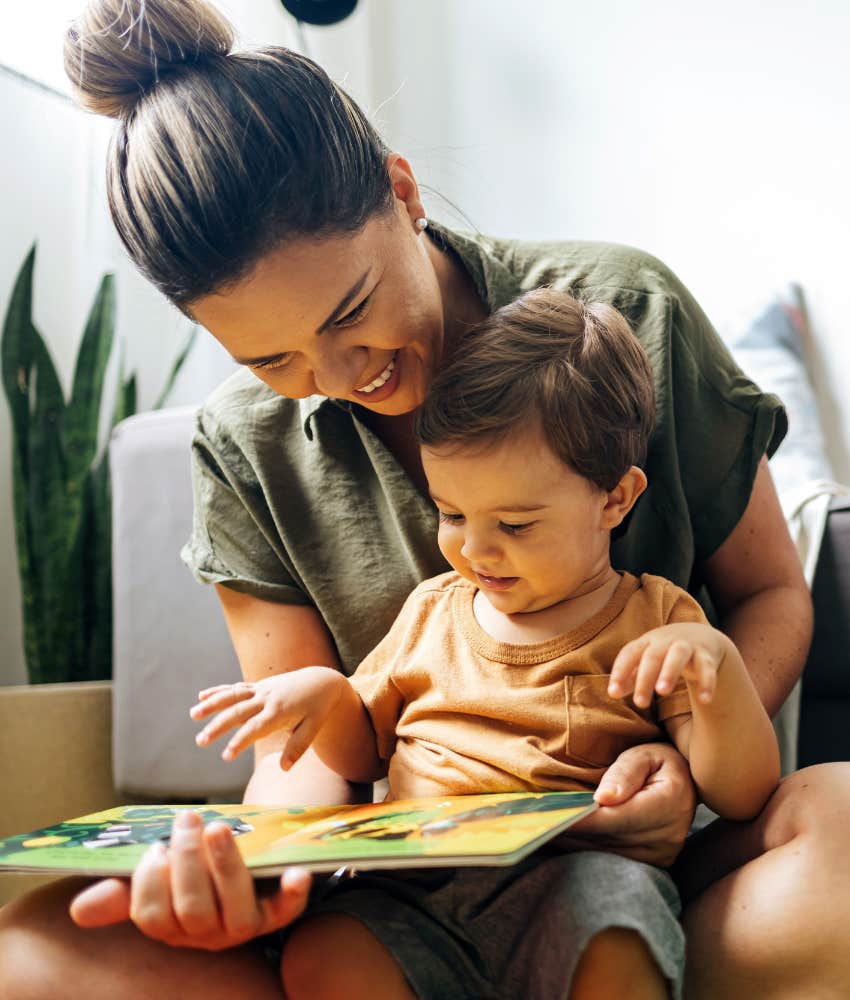If Your Parents Taught You These 39 Skills Growing Up, You're Probably A Very Intelligent Adult
You can't promise your kids an easy life, but you can make sure they feel loved, smart, and important.
 Peopleimages.com - YuriArcurs | Canva
Peopleimages.com - YuriArcurs | Canva Knowing how to be a good parent is one of the greatest mysteries of the human condition and the type of "life goal" endeavor that people will put everything else aside to accomplish.
One thing that any parent will tell you is that there are no half-measures in raising kids. They need to be loved entirely and unconditionally.
It is full-tilt love and affection, baseball games, and recitals. It is an 18-plus years-long marathon full of unique twists and hills that no one is ever really prepared for. We bring our hurt, pain, and feelings of inadequacy.
There are seemingly endless expert opinions on the subject, and while every kid and situation is unique, most people will agree that the most important thing you can do as a parent to foster intelligence into adulthood is to make sure your kids know that you love them. We asked 39 experts this question, from psychologists to social workers to parents and grandparents with kids of all ages.
If your parents taught you these skills growing up, you're probably an intelligent adult now:
1. How to admit your mistakes
"One of the most powerful gifts you can give your child is an admission that you made a mistake, and apologizing and asking for forgiveness confers respect to the child. The child learns that it is okay to make a mistake and correct it.
The child learns that it is possible to repair interaction. The child feels that their emotions are respected and that you, instead of being authoritative, are capable of being an emotional equal.
Most importantly, the child learns that one can be loved without being perfect. That feeling of unconditional love, of being able to repair negative interactions, of being mindful of your own emotions and those around you—that’s a wonderful foundation upon which any child, with their parent’s guidance, can build a fulfilling and successful life."
— John Gottman, Ph.D., Co-Founder of The Gottman Institute
2. How to show that love is a verb
 GagliardiPhotography | shutterstock
GagliardiPhotography | shutterstock
"My daughter and I were texting a few hours before her high school graduation earlier this week. After I told her what a great job she had done and how proud we all were of her, she said, "Thank you for guiding me every step of the way." Providing my kids with the proper guidance and an example of what love looks like has always been my approach to ensuring that they know they are loved.
I think that love is a verb, and we have to show them what living examples of love look like. While I tell my kids all of the time how much I love them, it is more important for me to show them with my actions how deep my love is."
— Dion Chavis, Executive Director, Black People Parenting
3. How to speak your child’s love language
"The other night, my family decided to talk about love languages. We took fun short quizzes and discussed what makes us feel the most loved and seen. Whether you ascribe to the Love Languages philosophy, I think at the end of the day, the thing that most helps my love land for my kids is knowing the language and landscape of their hearts. Physical affection, praise, and being present are at the top of the list.
I can learn that by observation or inquiry. Some cultures don’t have a phrase or word for 'thank you'. They choose instead to show gratitude through service and acts of kindness and fond regard. I love the power and simplicity of that because this is the world's truth. What we say and what we do should be indistinguishable. Love only amplifies this need and requires thoughtful action.
If I try to show my love in ways I think are best rather than what my kids need, I’m doing that act of service or kindness more for me than for them."
— Charlie Capen, Father of two and Vice President of GISH (Greatest Intl Scavenger Hunt)
4. How to love unconditionally
"You can tell me anything. There is nothing you can ever say that would separate you from my love."
— Julie Mayer Norvilas, Licensed Marriage Counselor, Therapist and Mom
5. How to avoid being judgmental
"Make them a priority in your life and your schedule. Love them always without judgment."
— Heather Allen, Social Worker and Mom
6. How to listen deeply
"Do not only believe in your children, believe them. Commit yourself to understanding their truth and reality as they experience it. Do not dismiss, ignore, make fun of, or minimize what they share. Listen deeply, and let them know you are right there with them, even when it's hard for you to hear. Kids mean what they say and will share openly if we don't train/punish them for it.
Connecting with your child from that raw and honest place in yourself anchors them in your love like nothing else."
— Leezá Carlone Steindorf, Award-Winning Author of Connected Parent, Empowered Child
7. How to respect their space and privacy
"I always respect my son's space and privacy and never enter his room unannounced without knocking."
— Dina Colada, Love Coach & Single Mom of 17-Year-Old son
8. How to embrace change and grow with it
"As our children are growing up they are constantly bombarded with changes in their environment and in themselves. They seek answers and conditions that allow them to embrace the changes without feeling diminished and lost. As parents, we must be willing to go there with them without judgment, resentment, or shame (theirs or ours).
If our children don’t feel like we can truly see who they are and who they are becoming, then they will not feel or believe in our love, no matter what we say. They will not confide in us if we are unaccepting or overly controlling. But, if we allow ourselves to witness and embrace their experiences, vulnerabilities, and transformations with transparency, care, concern, and genuine support, they will know they are loved because they will love themselves."
— Larry Michel, Couples and Family Restoration Coach. Founder of the Institute of Genetic Energetics. Father of three young adults.
9. How to follow through on your promises of attention
 PeopleImages.com - Yuri A | Shutterstock
PeopleImages.com - Yuri A | Shutterstock
"Listen, truly listen to your children. This means setting aside your agenda when they are speaking and listening to understand. It also means to honor them by being honest about the quality of attention you have to give in a specific moment. If you have good attention, listen attentively.
If you have so/so attention, tell them, 'Mommy/daddy can only give you part of my attention. Would that be okay?' When you have poor attention, admit it. 'I am distracted/upset/finishing something now. Can we talk in an hour?' Then do what you must to be ready with your attention when you said you would."
— Tara Brown, Certified Parenting by Connection Educator; Transformational Life Coach
10. How to understand the impact of emotional neglect
"The impact of not receiving love as a child: Our human needs separate from our basic needs are belonging, a sense of self-worth, and having a purpose, and it's set in a foundation of love and affection.
When we don't witness, experience, feel, and receive love as children, our ability to love ourselves and others healthily gets compromised and substituted with negative self-talk, insecurities, and a lack of trust in ourselves and others. We are not able to develop and maintain healthy relationships and overall good health.
Not knowing what love feels and looks like leads to making relationship decisions that can be painful, dangerous, and traumatizing, causing us to experience depression, loneliness, high stress, perfectionism, and grief, and it affects our physical health conditions based on the severity of emotional neglect experienced as a child."
— Nancy Andino, Certified Gestalt Therapist, Certified EMDR Therapist, Certified Alcohol and Substance Abuse Counselor
11. How to stay calm while parenting
"I convey my love to my children (and everyone else) by listening to them without judgment or criticism. Everyone wants to feel valued, and listening to their stories, thoughts, concerns, and desires validates them and encourages and empowers them.
Early in parenting, I decided that no matter what was said, I would remain calm because I knew that freaking out shuts off communication. So that means listen and encourage and if there is something that needs attending to, deal with it with calmness."
— Jean Walters, Transformational Coach
12. How to say the magic words
"I have always told them 'I love you' each morning and each night. At the end of each conversation, I still say 'I love you' and mention their name. My children are in their twenties and yet I always say I love you because it's a nice thing to hear. I never take it for granted that they know and that not mentioning it once will not matter. It always matters and so I always say 'I love you' followed by their name.
They never need to wonder or guess whether their mom loves them or not, they know it. Also, I never tell them what to do. I asked them what they would like to do. And if I ever feel they need to do something, I always say, 'Let's do this,' so they feel included in my ideas and not feel ordered.
Hugs are a bonus. I still always hug my children whenever we are together. In my texts, I write words but also include emojis to make them feel my words in pictures."
— Keya Murthy, M.S., Clinical Hypnotherapist, Spiritual Life Coach
13. How to make eye contact when you talk
"I learned early in parenting about three main ways we communicate love to our kids: eye contact, physical contact, and focused attention. Look them in the eye when they’re talking to you, as tempting as it may be to multitask on your phone.
Physical contact can be more than hugs, like a pat on the back, a touch on the arm in passing, playful taps on the shoulder, light tickling that’s age-appropriate, and even playful wrestling. Focused attention means listening to their feelings as well as their emotions and checking back: “Did I get that right?” These three modes of communicating love can’t be done unless you are in the present, which is where love is sent and received."
— Judy Tiesel-Jensen, Couple/Family Therapist, Mom of 3, Stepmom of 5
14. How to let them take the lead
"Kids need to be witnessed. I make time and space for them to be prioritized, seen, and delighted in. I listen to their thoughts and play their games, letting them run the show. I show my interest, admiration, and respect for who they are."
— Suzanne Manser, PhD Psychologist, Pother of Two
15. How to surround them with lifelong love
"I try to show in both my actions and words by honoring their bodies, respecting their boundaries, apologizing when I’m wrong, seeking help if I need additional support, and being available to answer any questions — no matter how embarrassing. I make sure my kids know I love them by saying 'I love you' ad nauseam until they beg me to stop.
I try to live as transparently as possible so they know without a doubt that all I care about is their safety and well-being. There is nothing they can do to make me love them more or less. I hope to surround them with so much love they take it for granted that they are worthy and wonderful human beings — and that when I’m dead, my love will still surround them."
— Virginia Duan, Self-Professed "Weirdly Attractive Writer," Mother of 4, Unabashed BTS Stan
16. How to develop a unique connection
 fizkes | Shutterstock
fizkes | Shutterstock
"I have three kids in different age ranges: 24, 18, and 5. Each of them has different interests, needs, and love languages.
My eldest daughter and I have special dates that she and I go on, and I've taken her with me on business trips. I show her I love her by being there to support her entrepreneurial interests and am always ready to listen to her when she needs advice. My youngest, Nilia, who's a Cancer, will often engage with me in this manner. 'Mommy?' 'Yes, Nilia?' 'I love you!' 'How much?' I ask. And then we compete with one another shouting ridiculous amounts of numbers, how much we love one another. It's our special way of sharing that our love is infinite!"
— Carmelia Ray, Celebrity Matchmaker & Relationship Expert
17. How to give them your time
"One of the best ways to show your kids you love them is to give them your time. Carve out time to do something they love to do, like playing a game, shooting some baskets, watching their favorite show, doing a TikTok dance, or having an at-home spa date.
It says, 'What you like matters,' and creates a shared experience — however little, that they can cherish. You'll also be surprised how much laughing and enjoying your dedicated parent-child time can do to connect emotionally, too. Your child will be more likely to confide in you, which will further deepen the bond."
— Lisa Petsinis, Career & Life Coach, Mom
18. How to validate their feelings
"Children are like all of us: They seek to be seen, understood, validated, and treated with compassion.
Too often, parents judge, criticize, or instruct rather than truly listen to understand. Most of us are busy and coping with our stress, but slowing down and connecting to our children is the greatest gift — for them and us.
Take the time to look into their eyes and enter their worlds with an open heart full of curiosity."
— Mary Kay Cocharo, LMFT Couple & Family Therapist
19. How to separate behavior from their identity
"Always separate your children from their negative actions. Let them know that they are special and loved, but what they did was a poor choice. This separation helps them feel the loving support they need to grow and make better choices in the future."
— Janis Roszler, PhD, LMFT, Licensed Marriage & Family Therapist; mom of 4, grandmother of 5
20. How to assure them you’ll always be there
"Being there for them in their time of need speaks louder than words.
One of my sons struggled briefly with depression while at college, a five-hour drive away. I offered to drive to get him so he could get away from the pressures of school and relationships. Despite his insistence that I needn’t rescue him, I told him I was coming to get him. I could hear the sense of relief over the phone. He was so grateful to come home for a few days. It meant the world to him to be reminded that his dad and mom had his back."
— Brent Roy, Personal Development Coach
21. How to let your love be absolute
"They have to know that your love for them has no boundaries. Show them there is nothing they can do or say that will cause you not to love them. There may be times that you wish they had made better choices, but you will stand with them no matter what. Your love must be the one thing they can count on."
— Dena Nielson, J.D., Family Law Attorney
22. How to make them feel truly seen
"We often assume what makes our kids feel loved based on what would make us feel loved.
So, I just asked my teen boys (and their friend who is here more than at his own home) how they feel loved by me. They answered with how caring and understanding I am. Caring, they explained, is about providing for them (mostly food — they are boys, after all) and being interested in their school, extracurriculars, and overall success. By understanding, they went on to say it is about how I talk to and listen to them. They said I 'notice' them and inquire when something seems amiss. I don’t let them go unseen.
Next, my biological child spoke these words, 'and I feel loved when you kick my ass. When you talk me through why there are boundaries and limits, I mean. I may roll my eyes, but I know you love me every time I leave the house and you say, ‘Remember who you are and what you stand for!’”
— Ann Papayoti, CPC, Relationship Coach, Author, Speaker, Boy Mom
23. How to shatter outdated social stigmas
 Geber86 | Shutterstock
Geber86 | Shutterstock
"I tell them I love them. Constantly. Multiple times a day and while looking them right in the eye before and after a hug and kiss. It's the first thing they hear in the morning and the last thing I utter to them as they drift off to sleep.
My dad bucked the toxic masculinity trend and still hugs and kisses every time we see each other, and that's a tradition I'm carrying on with my boys.
Aside from that, I spend special time with each of them doing something they like (golf, fishing, kayaking, hiking, video games) so they have my undivided attention and know I'm taking an interest in their interests. And when they ask an honest question, they always get an honest answer, even when it's uncomfortable. Especially when it's uncomfortable."
— Aaron Gouveia, PR Director, Author, Speaker, Dad of 3 Boys
24. How to love them without conditions
"Early on, I decided that I wanted my daughters to know that I loved them with no strings attached. I wanted them to know what that felt like.
One night, I decided that I wanted to try a nightly blessing before bedtime. So I said, 'I love you, I bless you, and I'm glad to be your dad.' My oldest daughter was pre-school age at the time. She looked at me and asked, 'And no matter what I do — will you always love me?'
She asked that question during the middle of a hard season when she was struggling with behavior issues. I paused, took a breath, and said the words that both she and I needed to hear. 'Yes. No matter what you do, I will always love you.' Both my daughters are in college, and I still use that blessing for them at night time when they come home. But this time, I tell them before my bedtime. Theirs is later than mine now!"
— Stanley J. Ward, Founder and Principal, Influence Coaching
25. How to own your shortcomings
"Our kids, especially our teens, want to feel accepted for who they are — not who you think they should be or wish they could be. Instead of judging what they are not, focus on their unique strengths and talents. Part of growing up means trying things, making mistakes, regrouping, and trying again.
Sometimes in our desire to protect our kids and demonstrate our love, we interfere with this essential process of learning by experience. Witnessing our children's efforts, validating what you see them doing, and acknowledging progress without expecting perfection is demonstrating a deep love that reflects acceptance and nurtures resilience.
With teens, it's especially critical to be accountable when you stumble so you are modeling the walk you want them to practice. The best thing that I've done in my relationship with my young adult kids has been to listen to the ways that they felt hurt by me, give a genuine apology, and change my behavior.
I've learned, sometimes the hard way, to listen more and talk less, tossing aside my expectations for a certain type of connection and simply being present in the ways they desire."
— Sharon Saline, Psy.D., Clinical Psychologist
26. How to weave a captivating tale
"Take time to tell a story. A story they love, a true story, a story completely made up. Tell a story and talk about what it means to them. Laugh and experience the sadness of the story. Also, listen to their stories."
— Cyndera Quackenbush, Author, Speaker, Storyteller
27. How to avoid burdening them with your unmet needs
"Real love means we don't project our unmet needs upon our children and expect them to meet our expectations. Real love for a child is when you allow them to be seen and heard for who they are.
It's accepting our child wholeheartedly no matter what. It is being able to respond to their needs so they can internalize the love within themselves. Unconditional positive regard is when we love our children no matter what."
— Nancy Carbone, Family Counselor
28. How to create shared routines
"A nice way to make your child feel safe and loved is by creating and sustaining a special routine. It doesn't have to be complicated or expensive. You are giving your child your time. Maybe it's a fun bedtime routine, special code words, or making their favorite cupcakes together on Sundays."
— Erika Jordan, Love coach, NLP practitioner
29. How to build safe environments for them
"As a parent, my top priority is providing my children a place where they can feel safe to be themselves and where they know they are loved and appreciated, no matter what.
I have found two practices that helped us a lot as a family:
The first: From when my kids were young, I set a goal for myself to give each of them at least one hour a week of 1-on-1 quality time. And I made sure I did this every week, no matter what. For that hour, I’d be fully available to my child, and we do whatever they choose to do.
Now that they are older and more independent, this has become a commitment to be available to them, if they want me to be.
The second is simply making it a priority to let my children know that I love them, no matter what. Even when they were not doing as I asked, having tantrums, or saying, 'I hate you, Mom,' I'd remind myself that it’s not personal — they are pushing against boundaries and against the emotions they are feeling. So I take a deep breath and tell them … 'Well, I still always love you.'
It hasn't always been easy, but these two simple things have made a huge difference over the years!"
— Anna McKinlay, Life & Wellbeing Coach, Mother of 2 teenagers
30. How to plan special days together
 Kleber Cordeiro | Shutterstock
Kleber Cordeiro | Shutterstock
"No matter their age, setting aside a 'special date day' with your child shows them that they are valuable in your life and worthy of a unique moment for bonding. Just like dating your spouse, it is an act of care, presence, and showing that you enjoy your time with them.
You gain the rare opportunity to teach your child valuable relationship skills for their future through the actions you reveal, helping them to learn how to establish and maintain love as well."
— Kendal Williams, Intimacy & Relationship Coach, Expert Coach on Lifetime TV for Married at First Sight, Mother of 7 children
31. How to be actively involved in their lives
"I make a point of including my teenage boys in everything, or at least providing an open invitation, whether planning a trip, preparing a meal, participating in social advocacy, showing gratitude, or issuing apologies — and I encourage them to do the same.
I let them see my vulnerability, sadness, joy, empathy, anger, all of it, the mistakes, and the gold stars. And we talk about it, maybe not then, and not always in an official capacity, but we use our examples (in addition to the endless supply the world has to offer) to move forward and, hopefully, be better.
I don’t know that there is a clearer exclamation of my love than to be active in their lives (while respecting their privacy and the occasional opting out), constant communication, and supporting them as situations dictate, but just in case, I also hug the hell out of them."
— Whit Honea, Author of The Parents' Phrase Book, "World's Greatest Dad" coffee cup recipient
32. How to adapt to their evolving needs
"I tell my two boys I love them, directly and frequently. I try to demonstrate that I am on their side and that I'll be there to celebrate the highs and to help figure out the lows. I recognize that I need to change as their needs for me and for our relationship change, and I regularly remind them that I am trying to figure all this out as well and that I'm not always going to get it right."
— Matt Schneider, Co-Founder, City Dads Group, Father of 2 boys (ages 16 and 13)
33. How to share your worldview with them
"I was a single parent for many years, and I tried to let my children know that I loved them in several ways in addition to telling them that I loved them. I tried to lead by example and show them that family was everything and that they were a part of the big picture. I felt that showing them respect and respecting others was important.
I believe it is important to be dependable for them. Creating time together and showing support for their ideas and activities was important. I tried to instill a solid value system. It was important for them to know that part of loving them was to teach them the importance of having God in their lives. I wanted to create an environment of love, support, and spirituality for them. Keeping the line of communication open and actively listening to them is essential."
— John Cappello, Psychic Medium, Author, Speaker
34. How to act on your feelings of love
"Love is implicit in both of the following actions, dependent on the quality of communication and time given: Discuss what's important to them in their lives and how they find and assess information for choices, beliefs, and assumptions.
In both cases, addressing underlying values and how they relate to family actions, choices, and values may be included over time. Why is love implicit? Because these actions and communication honor children and show you take them seriously."
— Ruth Schimel, Career & life management consultant, author, PhD
35. How to trust
"Teach them that you trust them to learn to navigate the world using their values, wisdom, empathy, and compassion. This means mentoring and sharing wins and losses, asking much more than telling, helping them keep their expectations and perspectives healthy and values-based, and learning to identify needs/feelings/connections between choices and outcomes. And making any conversation safe, even if it has triggered you.
Help them understand that life is full of challenges and they can develop the skills/tools/wisdom to handle it with love and compassion — especially self-compassion. It's not about getting it right, meeting others' expectations (including yours, except for safety/communication), or fitting into a mold."
— Cindi Ackrill, MD, PCC, FAIS- stress expert, coach, brain geek
36. How to be consistent
"I thought I would ask my son how he knows that I love him. He answered, 'You are consistent, you show up, and you are there for me. You hold me lovingly accountable and expect me to do my best. You always make it clear that I am a priority. You never judge me and always talk to me and tell the truth. You taught me to have respect for myself and self-worth. And you always say I love you."
— Cassandra Beauvoir, Ed.D, Psychotherapist
37. How to be fully present
"Show them with your time and attention that you value them. Make sure you are participating in what they want to do, not what you want them to do, or what you want to do. Establish a time of weekly open communication, and listen more than you talk. Laugh at their jokes. Play games. Say you're sorry when you've made a mistake.
Read their texts if that's the only way they want to talk. Cheer them on when appropriate. Let them lean on you, and never, ever lean on them. That can come later when you're 90 and they're 50.
For now, parenting is your job, and that's all about showing your unconditional love even in the face of their mistakes (which they will learn from)."
— Kathryn Brown Ramsperger, Life Coach
38. How to include them
"My 29-year-old son says, 'You always included me in everything you did.'"
— Bill Meleney, LMFT, MA, Life Coach
39. How to believe in them
"Be there. Be available and present for your child 'in the moment.' This message lets them know you love them and are there for them.
Hug them, talk with them, tell them you love them, and answer their questions. All of this reinforces the message that who they are and what they do is important to you and that you believe in them."
— Nancy Musarra Ph.D., Author of The New Normal: Seven Things to Know as You Care for and Love a Child with Special Needs
Dan O'Reilly is a writer who covers news, politics, and social justice.

